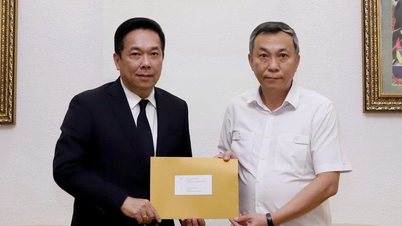
Knowing how to apologize will help heal wounds - Illustration: BetterUp
Relationships can be very helpful in life, but many conflicts also originate from here, causing pain, stress, and even breakups.
Knowing how to apologize can help heal wounds. On the other hand, apologizing the wrong way can make things worse.
Apologize sincerely and genuinely
A sincere apology shows empathy, genuine regret and remorse, and a commitment to learn from your mistakes. In other words, you need to truly understand that you were wrong, and regret the harm you caused.
A sincere apology can also bring relief, especially if you feel guilty. An apology alone doesn't erase the hurt or make things right, but it shows that you acknowledge your wrongdoing and are committed to preventing it from happening again in the future.
There are many valid reasons to apologize. It can be admitting you were wrong, addressing what is and isn't okay in a relationship, expressing regret and remorse, learning from a mistake and finding new ways to do things in the future, or finding ways to reconnect with your partner.
Not apologizing for wrongdoing can damage personal and work relationships, or lead to anger, resentment, and hostility that grow over time.
Research shows that the main reasons people don't apologize after doing something wrong are because they don't really care about the other person, because apologizing threatens their image, or they believe that apologizing won't do any good anyway.
Know when to apologize and take responsibility
According to Very Well Mind , knowing when to apologize is important. If you think you did something, intentionally or unintentionally, that upset someone, you should apologize and clarify the issue. If you feel upset when someone does the same to you, this is also a sign that you should apologize for your behavior.
Although a sincere apology can go a long way, many people find it difficult to say.
Admitting you're wrong can be difficult and can make you feel inferior. Researchers have found that people who believe their personalities can change are more likely to apologize. This is because they understand that change can happen, and see admitting mistakes as an opportunity to learn and grow.
Taking responsibility means admitting your mistakes. This is one of the most important, yet often overlooked, components of most apologies, especially those delivered through the media.
Vague statements like, "I'm sorry if you felt offended by what I said" imply that hurt feelings are a knee-jerk reaction from the other person.
In contrast, opening with, "When I said something hurtful, I wasn't thinking clearly. I realize I hurt your feelings. I'm sorry" acknowledges that you know exactly what you said hurt the other person. You accept that and take responsibility. Don't make assumptions and don't try to place blame.
Expressing regret and making amends
When apologizing effectively, it is important to understand the value of expressing regret. Let the other person know that you feel bad for hurting them and wish you hadn’t. This is empathy and sharing. The other person felt bad and they want to know that you felt the same way when you did wrong.
“I wish I could take back what I said,” “I wish I had thought about your feelings,” are ways to express regret, add sincerity, and let the other person know that you care about their feelings.
If there is anything you can do to improve the situation, do it. Part of being sincere is being willing to take action. If you are not sure what to do, ask someone else.
Statements that demonstrate an effort to change include, "I know my words hurt you. I should never have said that. I will think carefully before I speak in the future," "What can I do to regain your trust?"
Also, rebuild boundaries. Healthy boundaries are important in any relationship.
When people are in conflict, they often cross boundaries or social norms. Talk about the rules you and your partner will follow in the future, and what behaviors will be unacceptable, such as disrespect, yelling, lying, insulting, etc., to rebuild trust, boundaries, and positive emotions.
Don't apologize just because you want the other person to respond.
When you apologize, you take responsibility for your part of the conflict, not admitting that the entire problem was your fault. People are often reluctant to apologize first, because they think it's a sign of being "more wrong" or "a loser."
Apologizing even if only a small part of the problem was your fault is normal and healthy, allowing you to express regret, but also asserting boundaries of responsibility.
Be fair in your apologies, to the other person and to yourself.
Don't take all the blame if it's not your fault. On the contrary, trying to get the other person to apologize will be counterproductive.
Apology verbal or written?
A verbal apology is appropriate in most situations. But many people find it uncomfortable to apologize in person. If this compromises the sincerity of the apology, consider a safer option, such as a letter, email, or text message, to give yourself time to think it over. However, a written apology may take forever to receive a response, leaving the conflict unresolved.
An apology may be accepted if the other person listens or acknowledges reading the message, thanks or shows appreciation when you apologize, responds by saying "It's okay," "Don't ever do that again," or "Thanks, but I still need more time to think."
Even if someone accepts your apology, it doesn't necessarily mean they're ready to forgive. True forgiveness can take time, so be patient and patient.
Source




![[Photo] Cutting hills to make way for people to travel on route 14E that suffered landslides](https://vphoto.vietnam.vn/thumb/1200x675/vietnam/resource/IMAGE/2025/11/08/1762599969318_ndo_br_thiet-ke-chua-co-ten-2025-11-08t154639923-png.webp)






































![[Video] Hue Monuments reopen to welcome visitors](https://vphoto.vietnam.vn/thumb/402x226/vietnam/resource/IMAGE/2025/11/05/1762301089171_dung01-05-43-09still013-jpg.webp)
































































Comment (0)